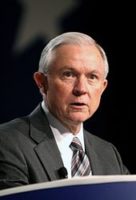By Aaron Miller
Attorney General, Jeff Sessions, has criticised the technology sector and vowed to intensify efforts on behalf of the U.S government against terrorism by battling illegal immigration and utilising electronic communications.
Speaking from the the U.S. attorney’s office not far from the site of the attack, he began by offering his condolences to the families of the victims.
He proceeded to lay out a three-point plan to combat terrorism more generally, which he said should include new immigration restrictions, improved access to electronic communications, and continued efforts to “aggressively surveill non-citizen terrorists overseas.”
“Terrorists should know: This administration will use all lawful tools at our disposal,” Sessions said, saying such tools will include using both federal courts and military proceedings at Guantanamo Bay prison in Cuba to prosecute terrorism suspects.
”If anyone has any doubt about that, they can ask the more than 500 criminals whom the Department of Justice has convicted of terrorism-related offenses since 9/11, he said, referring to the Sept. 11, 2001, attacks on New York and Washington. “And they can ask the dozens of enemy combatants in Guantanamo Bay.”
Sessions notably refrained from expressing his views about earlier recommendations made by President Trump that Saipov should be sent to Guantanamo. However, he concurred with the view by President Donald Trump to scrap a diversity visa program substitut it with a merit-based system.
U.S. Attorney General Jeff Sessions
Sessions on Thursday also harshly criticized Silicon Valley, saying technology companies too often “refuse to cooperate with law enforcement or even to comply with court orders.”
U.S. Attorney General Jeff Sessions makes a statement regarding national security in New York, U.S., November 2, 2017.
The U.S Attorney General took a swipe at electronic companies, rebuking their lack of co-operation in unlocking encrypted messages in order to intercept preparations for terrorist attacks before they occur. He claimed that the FBI had been blocked from accessing nearly 7,500 mobile devices, as he launched a thinly veiled attack on electronic companies, as he insinuated some degree of blameworthiness on electronic companies whose processes serve to hamper the U.S government’s efforts to monitor terrorists or potential terrorists. The American government should be granted access to monitor communications made by individuals adjudged highly suspicious, without any obstructions. Americans don’t want the governement to have a blank cheque that entitles them to intrude on our private communications, but special circumstances calling for sustained covert surveillance is imperative in these dark times of atrocious events.
Sessions alluded to a 2015 terrorist incident in Garland, Texas, where two gunmen opened fired with assault rifles at an exhibit featuring caricatures of the Prophet Mohammed.
Validating the importance and urgency of guaranteed collaboration from electronic companies, Sessions decried the failure of electronic companies successfully interecepting communications between terrorists leading up to the attack in Texas.
Sessions said one of the terrorists had sent more than 100 instant messages to another terrorist overseas.
“What we don’t know, however, is what he said – because those messages are encrypted,” he said.
The Justice Department in recent weeks has been signaling it plans to take a tougher stance with technology companies over accessing encrypted data.
Last month, Deputy Attorney General Rod Rosenstein also discussed the topic, and suggested attempts to negotiate with the tech sector were a waste of time because they valued profit over stopping crime
.




